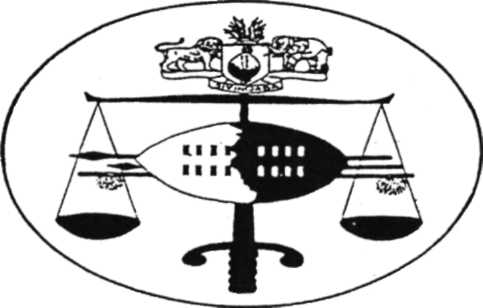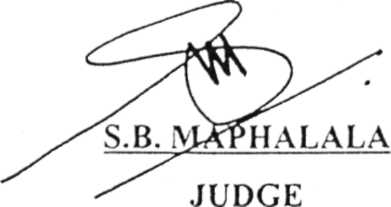Taxonomies
- Case indexes > Environmental
- Case indexes > Environmental > Human exploitation of the environment
- Case indexes > Environmental > Human exploitation of the environment > Land use
- Case indexes > Environmental > Litigation of environmental issues
- Case indexes > Environmental > Litigation of environmental issues > Locus standi in environmental litigation
- Case indexes > Commercial > Civil Remedies
- Case indexes > Commercial > Civil Remedies > Injunctions and interdicts


1

THE HIGH COURT OF SWAZILAND
INKHANYETI YEKUSA INVESTMENTS (PTY) LIMITED
Applicant
And
WALTER BENNETT et al Respondents
Civil Case No. 444/2004
Coram
For the Applicant For the Respondents
S.B. MAPHALALA - J MR. S. MASUKU MR. P. DUNSEITH
JUDGMENT
(12/11/2004)
[1] Serving before Court is an application on motion (in the long form) for an order interdicting and restraining the Respondents from any interference, physical interference or threats of violence calculated to prevent Applicant form the cultivation of sugar cane on Portion R/690 and Rem B/690 at Maphungwane, Mhlabubovu area; an order granting costs of this application; and granting the Applicant further and/or alternative relief.
[2] The Founding affidavit of One Samuel Magagula who is Chairman and Director of the Applicant is filed in support for the relief sought. A number of annexures are also filed labelled "SMI" to "SM9".
[3] The Respondents oppose the granting of this application and the answering affidavit of the 6th Respondent is filed thereto. A point of law in limine is raised in paragraph 4 of the said affidavit as follows:
"The Applicant has no locus standi to bring the application in that annexures SM4, SM5, SM6 and SM9 confer rights on the Inkhanyeti Yekusa Farmers Association, not the Applicant, and no facts are set out in the Founding affidavit establishing any right in the Applicant to bring the application on behalf of the Association".
[4] The Applicant then replied to the above as follows:
-4-
TO POINTS RAISED IN LIMINE
I submit that for all intents and purposes the rights conferred by annexures "SM4", "SM5", "SM6" and "SM9" are conferred to the Applicant and/or Applicant's members and should be treated as such by this Honourable Court for reasons set out herein below:
-
From in inception of the idea of the Sugarcane project members of Mhlabubovu Community came together to be formed into an association. They were advised by prospective financers that they could only be financed under a properly structured legal entity preferably a public company hence those community members interested in the project formed the Applicant which is in fact a public company and not a private company.
-
Members of Applicant which are community members of the Mhlabubovu area have always regarded themselves as members or shareholders of Inkhanyeti Yekusa Investments Limited. We have always dealt with all the authorities under this name.
-
Although different institutions and members of the public have loosely referred to us as Inkhanyeti Yekusa Farmers Association, we have accepted and dealt with all communications addressed to us as such and have taken such as ours and binding on us. The Honourable Court's attention is drawn to the fact that even the annexures attached to and in particular "SM5", "SM6" and "SM7" are addressed differently but have all been accepted by us. For example "SM5" is addressed to Inkhanyeti Yekusa Sugar Farming; "SM6" is addressed to a group of farmers at Maphungwane and "SM7" refers to Inkhanyeti Yekusa Cane Growers Association. I submit that all these annexures were intended for us trading in the name of Applicant.
4.4. At no stage has this been an issue to either us as members of Applicant or other members of the public and the authorities that we have dealt with in the past It will therefore be
absurd to conclude that the communication was never intended for the Applicant but for Inkhanyeti Yekusa Farmers Association.
[5] When the point of law in limine came for arguments Mr. Dunseith added a further point of law in limine that the Applicant cannot produce an environmental compliance certificate and therefore it is not entitled to the relief sought.
[6] The issues for determination presently, therefore is firstly whether the Applicant has locus standi to launch the present application. Secondly, the issue of the application to strike out the new evidence in Applicant's replying affidavit to establish locus standi and the third issue is that of the environmental compliance certificate. It appears to me that the issue of the application to strike out paragraph 4 of the replying affidavit ought to be addressed first and then the issue of locus standi.
[7] It was contended on behalf of the Respondents that in so far as the Applicant seeks to lead new evidence in its replying affidavit to establish its locus standi, this evidence should be struck out. In this regard the Court was referred to the legal authority in Herbstein & Van Winsen, The Civil Practice of the Supreme Court of South Africa, 4th ed at 364 and 366 to the effect that necessary allegations must appear in the supporting affidavits, for the Court will not, save in exceptional circumstances, allow the Applicant to make or supplement his case in his replying affidavit, and will order any matter appearing in it that should have been in the supporting affidavits to be struck out (see Coffee, Tea & Chocolate Co. Ltd vs Cape Trading Co. 1930 CPD 81 at 82).
[8] Mr. Masuku for the Applicant argued on this point that loci standi became an issue in Respondents affidavit and the Applicant therefore was obliged to give an explanation. He relied on what is said by the authors Herbstein et al at page 365 where the following appears:
"If, however, the new matter in the replying affidavits is in answer to a defence raised by the Respondent and is not such that it should have been included in the supporting

affidavits in order to set out a cause of action, the Court will refuse an application to strike out".
[9] It would appear to me, on reading the above-cited authority as it applies to the facts of the present case that the issue of locus standi should appear ex facie the Founding affidavit to establish a cause of action. A party who challenges locus standi as a point in limine cannot be said to have raised a defence because he is challenging the Applicant's right to be heard by the Court. Therefore, the authority in Herbstein (supra) cannot assist the Applicant in the present case. The result of this conclusion therefore is that paragraph 4 of the Applicant's replying affidavit ought to be struck out.
[10] Having found that paragraph 4 of the replying affidavit stand to be struck out it now behoves me to establish if the allegations in the Founding affidavit are sufficient to establish Applicant's locus standi. The Applicant relies expressly for its locus standi on annexures SM3, SM4, SMS, SM6, SM7 and SM9 of the Founding affidavit. However, on reading these annexures they do no confer any rights on the Applicant but an entity known as "Inkhanyeti Yekusa Farmers' Association" not the Applicant company "Inkhanyeti Yekusa Investment Limited". Therefore the Applicant has failed to establish any locus standi to enforce the rights purportedly conferred by the annexures upon which it relies.
[11] On the issue of the Environmental Compliance Certificate, my observations which I now make obiter in view of my findings on locus standi is that it cannot be a point of law in limine in that the Applicant has filed its application through the Senior Extension Officer in the Ministry of Agriculture, being an officer dealing with rural projects. I would think that the outcome of that application is still pending.
[12] For the afore-going reasons the application is dismissed with costs.